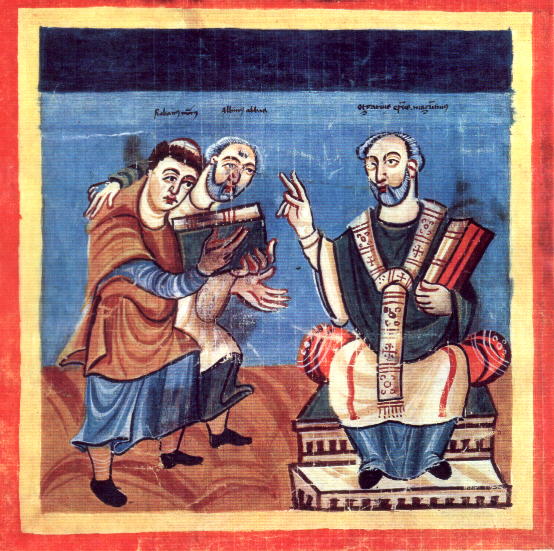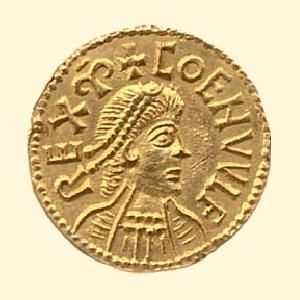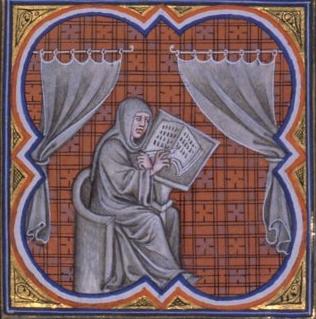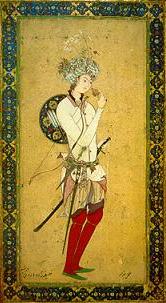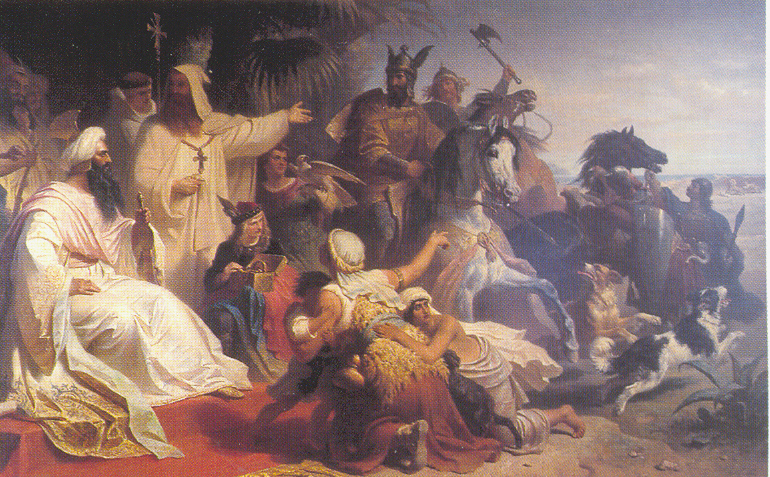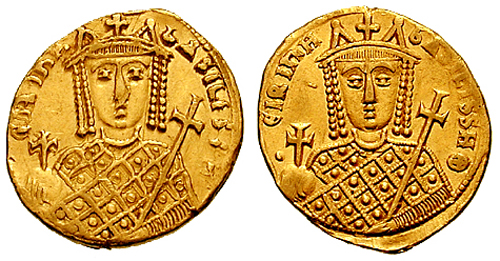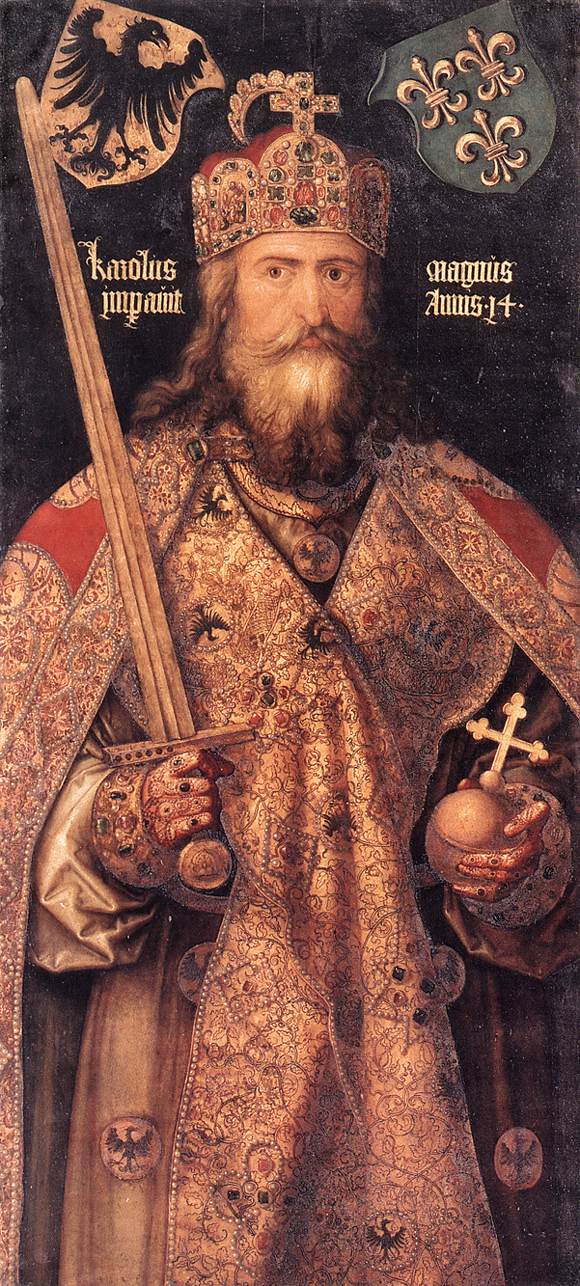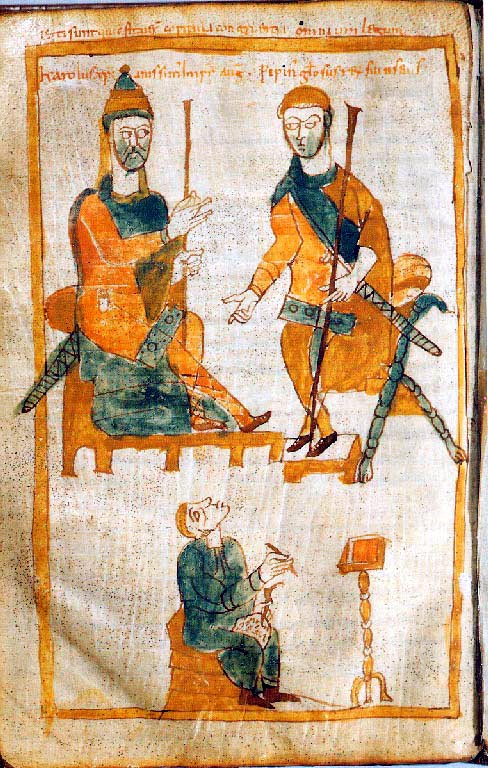European Rulers and Notable People (800 CE Supplement)
A -B -C -D -E -F -G -H -I -J -K -L -M -N -O -P -Q -R -S -T -U -V -W -XYZ
A[edit]
Áed Oirdnide mac Néill, High King of Ireland[1][edit]
Áed Oirdnide mac Néill (the epithet Oirdnide means ordained, referring to anointing as king) is King of Ailech and High King of Ireland. A member of the Cenél nEógain, he is the son of Niall Frossach. Áed freed the clergy of Ireland from military obligations.
Áed's son is Niall Caille.
High King Aed Oirdnide mac Néill has invaded Laighin. This conflict has not been decided.
Aethelheard, Archbishop of Cantebury[2][edit]
Æthelhard was an abbott before being named to the diocese of Winchester. He was consecrated Bishop of Winchester. He was translated from the episcopal see of Winchester to the Archbishopric of Canterbury in 793 and was enthroned archbishop on July 21, 793. This enthronement was presided over by the then-senior bishop of the land: Higbert, Archbishop of Lichfield. This enthronement required King Offa of Mercia to consult Alcuin of York over proper procedure, the archbishopric of Lichfield being new to the ecclesiastical landscape of England. In 798, Æthelhard was deposed by the Kentish king Eadbert II Praen because of Æthelhard's bias towards Mercia. However, Pope Leo III gave encouragement to the new Mercian king Cenwulf to depose Eadbert and restore Æthelhard to the archiepiscopal see in 798.
Since then, Æthelhard and Cenwulf have clashed. Cenwulf seeks to move the primary archiepsicopal see from Canterbury to London.
Al-Hakam I, Emir of Cordoba[3][edit]
Al-Hakam Ibn Hisham Ibn Abd-ar-Rahman I (Arabic: الحكم بن هشام) was Umayyad Emir of Cordoba from 796 until 822 in the Al-Andalus (Moorish Iberia).
On the south bank of the Guadalquivir river, in a suburb called al-Ribad, clerics plot rebellion.
Alcuin of York[4], Abbot of St. Martin at Tours[edit]
Alcuin is a scholar working for Emperor Karl. He is now in retirement, running the Abbey Saint Martin at Tours. He leads the intellectual and spiritual attack on the Adoptionist heresy.
Alfonso II, King of Asturias[5][edit]
Astrurias lies on the borders of Iberia, which is held by the Moors. Alfoso the Chaste rules this kingdom, and fights well against the Moors. He took retook Lisbon two years ago, in 798. He accepts the Holy Roman Empire as an ally. They have agreed to counter the Adoptionist heresy.
His sister, Ximena, is secretly married to Sancho, Count of Saldana.
Angilbert[6], Diplomat of Francia[edit]
Angilbert is a Frank who serves Karol as a diplomat. He is of noble parentage and was educated under Alcuin. He aided King Pepin in setting up his court in Italy. Angilbert delivered the document on Iconoclasm from the Frankish Synod of Frankfurt to Pope Adrian I, and was later sent on three important embassies to the pope, in 792, 794 and 796.
In 790 he was named as abbot of Saint-Riquier in northern France. (He was a layman. Laymen are often appointed abbots in this age.) He uses the monastery's funds to rebuild Saint-Riquier. Karol spent Easter there this year. He accompanied Karol to Rome where he was crowned Emperor.
Angilbert has a long-standing relationship with Bertha, Karol's daughter. Even though they are not married, they have produced several sons. He is a defacto son-in-law to the Emperor.
Ashot I Kuropalates[7], Leader of Armenia[edit]
Ashot I initially presided as an erismtavari in the area around Tbilisi and ruled over a territory that comprised most of the lands from Kvemo Kartli (“Lower Kartli”) in the south to Shida Kartli (“Inner Kartli”) in the north. Waging an incessant war against the Arabs, he at first succeeded in driving them from his dominions, but the Arabs soon took revenge, forcing him to flee from central Kartli to his south-western possessions in Tao-Klarjeti. Recognised as the presiding prince of Iberia and bestowed with the highest Byzantine court title of a kuropalates, he established himself in the deserted province of Klarjeti, where he restored the castle of Artanuji said to have been built by the Iberian king Vakhtang I Gorgasal in the 5th century. To revive the country devastated by the Arabs and cholera epidemics, he patronized the local monastic community established by Grigol Khandzteli, and encouraged the settlement of the Georgians in the region. As a result, the political and religious centres of Iberia/Georgia were effectively transferred from central Kartli to the south-western provinces of Tao-Klarjeti.
From his base in Klarjeti, Ashot fights hard to recover more Georgian lands from the Arab occupation.
B[edit]
Beorhtric, King of Wessex[8][edit]
Beorhtric has been King of Wessex since 786.
In 786, Cynewulf, king of Wessex, was killed by the exiled noble Cyneheard, brother of the former King Sigeberht. Beorhtric was supported by Offa, king of the Mercians against Egbert in an effort to influence West Saxon politics, and thus preserve the Mercian Ascendancy.
To an extent, Beorhtric is been subject to Offa's authority. In 787, he held the Synod of Chelsea jointly with Offa, and in 787 he married one of Offa's daughters, Eadburh Anglo-Saxon Chronicle. Land that had traditionally been on the borders of Mercian and Wessex were administered by the Mercian court, as is seen in Charters of Offa, and his son Ecgfrith. West Saxons seem to have used Offa's currency: a recent survey of early medieval single coin finds reveals a trail of Offa pennies running from the Upper Thames to Wareham, a site connected with Beorhtric. In 1854 a coin from his reign was found 2 miles ouside of Andover. It weighed 22 grains and is extremely rare.
It was during Beorhtric's reign that the first Viking raids on England occurred. In 789, Vikings landed on the Dorset coast, near the Isle of Portland, where they killed a royal official, the shire reeve.
After Offa's death in 796, Mercian power over England was weakened, and Beorhtric may have exercised more independence during this period. The only two West Saxon coins to have survived from Beorhtric's reign were produced at this time, suggesting that he had established a new mint. Within a few years Offa's successor, Coenwulf, had restored Mercia's position, and after 799, Beorhtric's relationship with the Mercians seems to have been largely similar to the situation before Offa's death.
C[edit]
Cathal, King of Hy-Many[9][edit]
Cathal mac Murchadh is King of Hy-Many, Ireland.
Caustantín[10], King of the Picts[11][edit]
Caustantín mac Fergusa (Constantine son of Fergus) has been king of the Picts since 789. He is a grandnephew to the first king Óengus mac Fergusa. This family originated in Circinn, and has ties to the Eóganachta of Munster in Ireland.
The Vikings are active on the western coasts of Scotland. Iona has been attacked. Abbot Noah of Kingarth, on the Isle of Bute, was killed by raiders.
- Transfer the Monymusk Reliquary, which contains the bones of St. Columba, from Iona to Dunkeld, there to establish a new church (820 CE, time compression).
Charles the Younger[12], King of the Franks[edit]
Charles rules Anjou, Maine, and Touraine. He rules these lands for his father, Emperor Karol. He is also called King of Neustria.
Coenwulf, King of Mercia[13][edit]
Coenwulf became king of Mercia after the death of Ecgfrith, in December 796. Coenwulf was a descendant of Cenwalh of Wessex (d. 674), who had married and repudiated a sister of the kings Penda and Eowa 150 years earlier; thus Coenwulf was a member of a the Mercian royal line through female descent, which may demonstrate the thoroughness of Offa's purge of the Mercian royal house.
The Kingdom of Kent, which had been ruled as a Mercian territory since 785, rose in rebellion in 796. Coenwulf won the Church's backing for a reconquest of Kent, in large part due to its dissatisfaction with the exile of the pro-Mercian Archbishop of Canterbury, Aethelheard, who fled in the face of the rebellion. In 798, Coenwulf invaded Kent, deposed and captured the rebel king Eadberht III Præn, and made his own brother Cuðred king of Kent. Eadbert Praen was imprisoned at Winchcombe, a religious house closely affiliated with Coenwulf's family which housed the royal archives and was presided over by Coenwulf's daughter Cwoenthryth.
Constantine VI, Emperor of Byzantium[14][edit]
Constantine VI was the only child of Emperor Leo IV and Irene. Constantine was crowned co-emperor by his father in 776, and succeeded as sole emperor at the age of nine under the regency of Irene in 780.
In 782 he was betrothed to Rotrude, a daughter of the Frankish King Karol by his third wife Hildegard. Irene herself broke off the engagement in 788. In 787 Constantine had signed the decrees of the Second Council of Nicaea, but he appears to have had iconoclast sympathies. By then Constantine had turned 16 years old, but his mother did not relinquish executive authority to him.
After a conspiracy against Irene was suppressed in the spring of 790 she attempted to get official recognition as empress. This backfired and with military support Constantine finally came to actual power in 790, after the Armenians in the army rebelled against Irene. Nevertheless, she was allowed to keep the title of Empress, which was confirmed in 792.
The weakness of Constantine caused dissatisfaction among his supporters. He showed unheroic behaviour after the defeats at the hands of Kardam of Bulgaria in 791 and 792. A movement developed in favor of his uncle, the Caesar Nikephoros. Constantine had his uncle's eyes put out and the tongues of his father's four other brothers cut off. His former Armenian supporters revolted after he had blinded their general Alexios Mosele. He crushed this revolt with extreme cruelty in 793.
He then divorced his wife Maria of Amnia, who had failed to provide him with a male heir, and married his mistress Theodote, an unpopular and possibly illegal act, although the Patriarch ignored it. By his actions Constantine had lost all support, both of the ruling orthodox and the iconoclast opposition.
In 797 Constantine was captured and blinded by the supporters of his mother, who had organized a conspiracy. Hhe survived the blinding.
Cuthred, King of Kent[15][edit]
Cœnwulf established Cuðred as King of Kent in 798, after the revolt of Kent under Eadberht III. Cuðred's reign has seen the first raids of Kent by the Vikings.
Cwoenthryth, Princess of Mercia.[edit]
Daughter of the Coenwulf, the King of Mercia.
Cynan Dindethwy, King of Gwynedd[16][edit]
Cynan is king of Gwyned on the island of Britain.
Cynan was son of Rhodri Molwynog ap Idwal and Margaret ferch Duplory. After his father died, his cousin, Caradog ap Meirion, ascended the throne. After his cousin died in 798, Cynan ascended the throne.
Cynan, King of Strathclyde[17][edit]
Cynan is the king of Strathclyde. The vikings raid this area.
D[edit]
E[edit]
Eadbert Praen[18], Deposed King of Kent[edit]
Eadberht III Præn was the King of Kent from 796 to 798. His brief reign was the result of a rebellion against the hegemony of Mercia, and it marked the last time that Kent existed as an independent kingdom.
Offa of Mercia ruled Kent directly from 785 until 796, when Offa died and Eadberht took possession of Kent. Eadberht had previously been in exile on the continent under the protection of Karol, and his rebellion served Frankish interests.
The pro-Mercian Archbishop of Canterbury, Aethelheard, fled during the rebellion. Cœnwulf of Mercia was engaged in correspondence with Pope Leo III at this time concerning the situation of the Church in England, and in the course of this Leo accepted a Mercian reconquest of Kent and excommunicaticated Eadbert, on the grounds that he was a former priest. Having received papal approval, Cœnwulf reconquered Kent and captured Eadberht in 798. Cœnwulf ravaged over Kent and captured Eadberht Præn, their king, and led him bound into Mercia. Eadbert Praen is imprisoned at Winchcombe, a religious house closely affiliated with Coenwulf's family which houses the royal archives and is presided over by Coenwulf's daughter Cwoenthryth.
Eardwulf, King of Northumbria[19][edit]
Eardwulf is king of Northumbria. He is the son of Eardwulf and descendant of Eanwine.
Eardwulf came to rule in a time of strife. Æthelred was murdered, and was followed as king by Osbald. Eardwulf deposed Osbald after twenty-seven days. Osbald fled to the land of the Picts with a few supporters. Eardwulf became king on 14 May 796, and was conscrated by Eanbald I, Archbishop of York, and Bishops Æthelberht, Baldwulf, and Hygbald, in York on 26 May 796.
Eardwulf was married before he became king as Alcuin of York reproached him for abandoning his wife for a concubine soon after his coronation. His repudiation of his wife will have strained relations with Archbishop Eanbald II—Eanbald I died in the year of Eardwulf's coronation. Alcuin, while condemning secular oppression of the church, notes with surprise that the Archbishop Eanbald was accompanied by a large retinue, including soldiers, while travelling, and that he received and protected the king's enemies.
Although Æthelred had been Eardwulf's enemy, Æthelred's killers proved to be equally hostile. In 798 a battle was fougt near Whalley between Eardwulf and a certain dux named Wada. Wada was put to flight. Among the dead was Alric, son of Heardberht, but whether he fought for Eardwulf or against him is not recorded. At about this time, Osbald appears to have planned on returning from his Pictish exile, but his death, as an abbot is recorded in 799.
In 799, an ealdorman named Moll was killed by Earnwulf's "urgent command". Moll's name has suggested that he was a kinsman of the late King Æthelred, whose father was Æthelwald Moll. The following year, Ealhmund, "the son of King Alhred, as some say", was killed by Eardwulf's men. Ealhmund was remembered at Derby, in the neighbouring kingdom of Mercia, as a saint.
King Cenwulf of Mercia supported the unfortunate Eahlmund. This has lead to open warfare between the two kingdoms.
Einhard[20][edit]
Einhard is a monk, Frankish historian and a dedicated servant of King Karol. Einhard is from the eastern part of the Frankish kingdom, the portion that is still German speaking. He was educated at Fulda which is one of the most impressive centres of learning in the Frankish lands. He was accepted into the court of Karol in 791. Karol has put him in charge of the completion of several palace complexes including Aachen and Ingelheim. Einhard hopes to be appointed to a government office.
Eochaid, King of Ulaid[21][edit]
Eochaid is King of Ulaid, Ireland.
F[edit]
Finsnechta, King of Leinster[22][edit]
Finsnechta Cethardec mac Cellach is the second King of Leinster to be inaugurated and based on Lyons Hill, Ardclough, County Kildare, a member of the Uí Dúnchada, one of three septs of the Uí Dúnlainge dynasty which rotates the kingship of Leinster. High King Aed Oirdnide mac Néill has invaded Laighin. This conflict has not been decided.
G[edit]
Gisela[23], Abbess of Chelles[24][edit]
Gisela (757 – ) is the only daughter of Pippin the Younger and his wife Bertrada of Laon. She is the sister of Karol and Carloman. Gisela has been dedicated to religion since her childhood. She became a nun at the abbey of Chelles, Seine-et-Marne, where she is now abbess. She has good relations with her brother Karol, who "treats her with the same respect which he showed his mother."
Karol and his wife Hildegard named their daughter after Gisela. Gisela the younger was born in 781.
Giovanni Galbaio, Doje of Venice[25][edit]
Giovanni Galbaio is the eighth Doge of Venice. He succeeded his father Maurizio Galbaio, who had associated him as doge in 778. The Byzantine emperor Leo IV the Khazar recognized his title in that year, though the attempt to set up a hereditary monarchy endangered Maurizio's own dogeship.
Giovanni had been briefly held captive by the Lombard king Desiderius after a campaign in Istria, but his father, through the pope, sent ambassadors to Karol, the king of the Franks, to petition for getting Giovanni's release.
Upon his inheriting, without election, the full office of his father, he immediately began a vendetta against the patriarch of Grado, who represented the church and its opposition to the slave trade. Karol, a dutiful son of the church and now king of Lombardy, supported the abolition of slavery in his domains and thus came to resent the Venetian commerce in the Adriatic. The patriarch, in the reign of Maurizio, had even instigated the expulsion and confiscation of goods of the Venetian merchants in the Pentapolis. Giovanni had the Empress Irene name his son Maurizio co-doge.
Trying to counter-influence the patriarch, Giovanni appointed his sixteen year-old nephew Christopher bishop of Olivolo. The patriarch refused to consecrate him, officially due his age, but actually because of his anti-Frankish stances. Maurizio II was sent to attack Grado with a flotilla of ships. There the elderly patriarch was thrown to his death from the tower. The opposition to the Galbaii family fled to Treviso while the nephew of the patriarch, Fortunatus, was elected in his stead and immediately fled to the Frankish court. The opposition crystallised under the leadership of one Obelerio degli Antenori and returned to Venice.
H[edit]
Harun al-Rashid, Caliphate of Baghdad[26][edit]
Hārūn al-Rashīd (Arabic: هارون الرشيد) is the fifth Abbasid Caliph.
Hārūn was the son of al-Mahdi, the third 'Abbasid caliph (ruled 775–785), and al-Khayzuran, a former slave girl from Yemen and a woman of strong personality who greatly influenced affairs of state in the reigns of her husband and sons. Hārūn was strongly influenced by the will of his mother in the governance of the empire until her death in 789.
Hārūn became caliph when he was in his early twenties. On the day of accession in 789, his son al-Ma'mun was born, and al-Amin some little time later: the latter was the son of Zubaida, a granddaughter of al-Mansur (founder of the city of Baghdad); so he took precedence over the former, whose mother was a Persian slave-girl. He began his reign by appointing very able ministers, who carried on the work of the government so well that they greatly improved the condition of the people.
It was under Hārūn ar-Rashīd that Baghdad flourished into the most splendid city of its period. Tribute was paid by many rulers to the caliph, and these funds were used on architecture, the arts and a luxurious life at court.
In 796 the Caliph Hārūn ar-Rashīd decided to move his court and the government to Ar Raqqah at the middle Euphrates in order to better control his territory.
Hārūn gave great encouragement to learning, poetry and music. He was a scholar and poet himself and whenever he heard of learned men in his own kingdom, or in neighboring countries, he invited them to his court and treated them with respect. The name of Hārūn, therefore, became known throughout the world. Harun had diplomatic relations with China and with Karol, the latter seeking access to the Holy Land for Christian pilgrims.
In military matters, Hārūn was an excellent soldier and showed this ability at a young age when his father was still caliph. His defeated Constantinople's army. Empress Irene agreed to pay tribute to the Caliphate.
In most respects, Hārūn was religiously tolerant, devout, and learned.
In 795, to prevent Shiite rebellions, Hārūn imprison Musa al-Kazim, the Shiite imam. He ordered his death by poison in 799.
- Travel as Karol's envoys to the Caliphate.
- Return bearing rich gifts, including an elephant.
I[edit]
Ibrahim I ibn al-Aghlab, Emir of Ifriqiya[edit]
Ibrahim I ibn al-Aghlab has just been appointed the first Emir of Ifriqiya (800). He is the son of al-Aghlab, who successfully quelled the revolt of the Kharijites. Ifriqiya is bounded on the south by the semi-arid areas and salt marshes called el-Djerid. Its capital is Qayrawan in central Tunisia. He is currently organizing an army of African slaves, suspicious that his Arab soldier may revolt.
Idris[27] I, King of the Idrisid Kingdom[28][edit]
Idris I is the great grandchild of Hassan, son of Ali the cousin of prophet Muhammad. He escaped from the rule of the Abbasids in 786 and took refuge to North Africa to establish the Idrisid dynasty.
He first settled nearby the Roman site of Volubilis where he founded the town of Moulay Idriss near the hill of Zarhon surrounding the native Berber tribes.
At first he conquered a small territory in the north of Morocco, thus making him being recognized by Berber king of the tribe of Awraba. This event is considered a consolidation and the birth of both the Idrisid dynasty and the birth of Morocco, the second Muslim State after Al Andalus which cut off relationships and became independent from the Muslim Abbasid caliphate of Baghdad.
Idris I then captured Tlemcen in 789 which became part of the kingdom.
- This succession of events prompted vengeance from the Abbasid caliph Harun Al-Rashid, who sent an emissary called Al-Chamakh to poison Idris.
Ilyâs ibn Sâlih[29], Leader of Berghouata[30][edit]
Ilyâs ibn Sâlih is the leader of the Berghouata. He professes Islam publicly but Salih's religion secretly.
Iris, Empress of Byzantium[31][edit]
Iris was a beautiful and noble orphan girl from Athens. Constantine V picked her from a "bride show", and brought her to Constantinople to marry his son, Leo IV in 769. In 711, she gave birth to Constantine VI. Constantine died prematurely in 780. He left Iris as sole guardian of the Byzantine Empire and the nine-year-old Constantine VI.
Irene was immediately confronted with a conspiracy to raise to the throne the Caesar Nikephoros, a half-brother of Leo IV. To overcome this challenge, she had Nikephoros and his co-conspirators ordained as priests, and ordered them give communion on Christmas day. Irene next had to subdue a rebellion led by Elpidios, the governor of Sicily. A first fleet sent against him was defeated in 781, but the second succeeded in driving the rebels into Africa in 782.
In 781, Irene sought a closer relationship with the Carolingians and the Papacy. She negotiated a marriage between her son and Rotrude, a daughter of Karol by his third wife Hildegard. Irene went as far as to send an official to instruct the Frankish princess in Greek; however, Irene herself broke off the engagement in 787, against her son's wishes.
Her most notable act was the restoration of the orthodox veneration of icons or images, a policy which she had always secretly favoured, though compelled to abjure it in her husband's lifetime. While this improved relations with the Papacy, it did not prevent the outbreak of a war with the Franks, who took over Istria and Benevento in 788.
As Constantine approached maturity he began to grow restive under her autocratic sway. An attempt to free himself by force was met and crushed by the empress, who demanded that the oath of fidelity should thenceforward be taken in her name alone. The discontent which this occasioned swelled in 790 into open resistance, and the soldiers, headed by the Armenian guard, formally proclaimed Constantine VI as the sole ruler.
A hollow semblance of friendship was maintained between Constantine and Irene, whose title of empress was confirmed in 792; but the rival factions remained, and Irene, by skillful intrigues with the bishops and courtiers, organized a powerful conspiracy on her own behalf. Constantine could only flee for aid to the provinces, but even there he was surrounded by participants in the plot. Seized by his attendants on the Asiatic shore of the Bosphorus, the emperor was carried back to the palace at Constantinople; and there, by the orders of his mother, his eyes were gouged out. He later died from his wounds. A solar eclipse and a darkness of 17 days' duration followed. His wounds were not fatal, and he still lives.
Irene pays a yearly tribute to the Caliphate of Baghdad, ruled by Hārūn.
Nikephoros, her finance minister, seeks to overthrow her.
J[edit]
Johannes, King of Macuria[32][edit]
Johannes is the King of Macuria.
K[edit]
Kardam, Khan of Bulgaria[edit]
Kardam is the elderly ruler of Bulgaria. He does not have long to live.
In retaliation for the Bulgarian incursions in the Struma valley, Constantine VI embarked on an expedition against Bulgaria. Kardam pre-empted the Byzantine invasion and met the enemy near Adrianople in Thrace. The Byzantine army was defeated and turned to flight.
In 792 Constantine VI led another army against the Bulgarians and encamped at Marcellae (near Karnobat), which he proceeded to fortify. Kardam arrived with his army on July 20 and occupied the neighboring heights. After some time passed with the two forces sizing up, Constantine VI gave in to the reassuring advice of a "false prophet" and ordered the attack. But the Byzantine forces lost formation and once again were defeated and turned to flight, while Kardam captured the imperial tent and the emperor's servants (battle of Marcelae). After his return to Constantinople, Constantine VI signed a peace treaty and undertook to pay an annual tribute to Bulgaria.
By 796 the imperial government was recalcitrant and Kardam found it necessary to demand the tribute while threatening to devastate Thrace if it were not paid. Constantine VI mocked the demand by having dung sent instead of gold as "fitting tribute" and promising to lead a new army against the elderly Kardam at Marcellae. Once again the emperor headed north, and once again it encountered Kardam in the vicinity of Adrianople. The armies faced each other for 17 days without entering into battle, while the two monarchs engaged in negotiations. In the end conflict was averted and the peace resumed on the same terms as in 792.
The reign of Kardam represents the restoration of order in Bulgaria, which had suffered from a rapid turnover of rulers and had been repeatedly defeated by the Byzantines in the third quarter of the 8th century. Kardam not only stood his ground against Constantine VI (who was trying to emulate his much more successful grandfather and namesake Constantine V), but he may have succeeded in precipitating a crisis at the Byzantine court, where Constantine VI's repeated failures undermined the emperor's position and he was dethroned by his mother Irene in 797.
Karol, Emperor of the Holy Roman Empire[33][edit]
Emperor Karol the Great (often called Charlemagne) is King of the Franks and newly crowned Emperor of the Holy Roman Empire. He expanded the Frankish kingdoms into a Frankish Empire that incorporated much of Western and Central Europe. He conquered Italy and was crowned Imperator Augustus by Pope Leo III in an attempted revival of the Roman Empire in the West.
The son of King Pepin the Short and Bertrada of Laon, and descended from Charles Martel, he succeeded his father and co-ruled with his brother Carloman until the latter's death in 771. Charlemagne continued the policy of his father towards the papacy and became its protector, removing the Lombards from power in Italy, and waging war on the Saracens, who menaced his realm from Spain. It was during one of these campaigns that Charlemagne experienced the worst defeat of his life, at Roncesvalles (778). He also campaigned against the peoples to his east, especially the Saxons, and after a protracted war subjected them to his rule. By converting them to Christianity, he integrated them into his realm.
He speaks Frankish, Latin, and Greek.
Karol is strong, white haired, and tall (6'4").
Karol dresses like other Franks, in linen and tunics. He wears a blue cloak and always carries a sword with him. He dislikes fancy dress.
He is Roland's maternal uncle through lady Bertha.
He disinhereted his oldest son, Pippin the Hunchback.
The conquest of Italy brought Charlemagne in contact with the Saracens who controll the Mediterranean. Pippin, his son, is much occupied with Saracens in Italy. Charlemagne conquered Corsica and Sardinia and in 799 the Balearic Islands. The islands are often attacked by Saracen pirates, but the counts of Genoa and Tuscany (Boniface) keep them at bay with large fleets.
Charlemagne will soon have contact with the caliphal court in Baghdad.
Karl defeated the Saxons, forcing them to Christianize. He defeated and absorbed Bavaria. He defeated the Avars, but even now, a the Bulgarians following Krum are fighting for this area.
In Hispania, the struggle against the Moors continued unabated. His son Louis was in charge of the Spanish border. In 785, his men captured Gerona permanently and extended Frankish control into the Catalan littoral. The Muslim chiefs in the northeast of Islamic Spain were constantly revolting against Córdoban authority and they often turned to the Franks for help. The Frankish border was slowly extended until 795, when Gerona, Cardona, Ausona, and Urgel were united into the new Spanish March, within the old duchy of Septimania.
In 797, Barcelona, the greatest city of the region, fell to the Franks when Zeid, its governor, rebelled against Córdoba and, failing, handed it to them. The Umayyad authority recaptured it in 799. However, Louis of Aquitaine marched the entire army of his kingdom over the Pyrenees and is currently sieging it.
Danish attacks have begun against his empire.
He presides over a flowering of culture and literacy. He has invited the greatest scholars to his kingdom. He himself can read.
Aachen is the captial.
Karol moves against the Adoptionist heresy.
Krum[34], Ruler of the Bulgaria[35][edit]
Krum is ruler of Bulgaria. He has recently risen to power, and is eager to expand Bulgaria's territory. He hails from Pannonia, where his family was in Avar service.
L[edit]
Leo III, Pope, Bishop of Rome, Patriarch of the West[36], Ruler of the Papal States[edit]
Pople Leo III is the Bishop of Rome and Patriarch of the West.
Leo, coming from a common-folk background, aroused the hostility of Rome's nobility, who saw the papal post as reserved for noble candidates. During his rule he was accused of adultery and perjury. In April 799 he was attacked by a gang, who attempted to gouge out his eyes and cut off his tongue for his earlier actions. He was then formally deposed and sent to a monastery, but escaped and made his way to Charlemagne, who escorted him back to Rome under royal protection. Needing help against enemies in Rome and seeing the throne of the Byzantine emperor as vacant (lacking a male occupant), Leo III crowned Charlemagne as Roman Emperor in 800. This is seen as an insult to Byzantium and the Orthodox Church and is causing a rift between the Eastern Orthodox Church and the Roman Catholic Church.
- Somebody helped him to escape.
- Nobles still conspire to overthrow this Pope.
Leo III refuses to recognize Iris as the Empress of Byzantium.
Louis the Pious[37], King of Aquitaine[edit]
Louis is the King of Aquitaine. He rules this territory for his father, Emperor Karol. He is the third son of Hildegard. Louis maintains the frontier called the Spanish March. He is currently sieging Barcelona.
M[edit]
Muiredach, King of Mide[38][edit]
Muiredach mac Domnaill is King of Mide, Ireland.
Muirguius, King of Connacht[39][edit]
Muirgius mac Tommaltach is King of Connacht.
N[edit]
Niall Caille, Prince of Ailech[edit]
Prince Niall Caille is the son of King Áed Oirdnide mac Néill, King of Ailech and High King of Ireland.
Nikephoros[40], Finance Minster of Byzantium[edit]
This is Empress Irene's finance minister. A patrician from Seleucia Sidera, his family is of Arab descent. With nobles and eunichs, he plots to take the throne of Byzantium away from Irene. He is aided by his son, Staurakios.
Nikephoros is of arab descent.
O[edit]
P[edit]
Paul the Decon[41][edit]
Paul the Deacon is a Benedictine monk and historian of the Lombards.
Born in 723 to a noble Lombard family, Paul received an exceptionally good education at the court of the Lombard king Rachis in Pavia, learning from Flavian the rudiments of Greek. It he became secretary to the Lombard king Desiderius, the successor of Rachis. This king's daughter, Adelperga, was his pupil.
In 774, he entered a monastery, and in 782 he became resident in the great Benedictine house of Monte Cassino, where he made the acquaintance of King Karol. He served Karol for many years. He has lately returned to Monte Cassino, and now creeps towards death.
Pepin, King of Lombardy[42][edit]
Pepin is the King of Lombardy, sometimes called the King of Italy. Pepin's first child has just been born. He is the son of Emperor Karol and rules this land for this father.
Pepin the Hunchback[43], Prince of the Franks[edit]
Pepin is the eldest son of Emperor Karol. He was duped into leading a rebellion against his father. His associates were executed. His father had mercy upon him and placed him in the monastery of Prüm.
Q[edit]
R[edit]
Rorgon[44], Count of Maine[edit]
Rorgon is the Count of Maine. He is a son of Gauzlin I and Adeltrude.
He is a retainer at the court of Emperor Karol. He he had a sexual relationship with Karol's daughter Rotrude. They had at one illegitimate child, Louis, who is but a child.
Rotrude[45], Princess of the Franks[edit]
Born 775, Rotrude is the second daughter of Charlemagne from his marriage to Hildegard.
She was educated in the Palace School by Alcuin, who affectionately calls her Columba in his letters to her. When she was six, her father betrothed her to Constantine VI of Byzantium, whose mother Irene was ruling as regent. The Greeks called her Erythro, and sent a scholar monk called Elisaeus to educate her in Greek language and manners. However, the alliance fell apart by 786 when she was eleven, and Constantine's mother, Irene, broke off the engagement in 788.
She then became the mistress of Rorgo of Rennes. She never married.
Rotrud eventually became a nun, joining her aunt Gisela, abbess of Chelles.
- The two women have authored a letter to Alcuin of York requesting that he write a commentary explaining the Gospel of John. Alcuin is at Tours. Deliver the letter.
S[edit]
Sa'id I ibn Idris[46], Emir of Nekor[47][edit]
Sa'id I ibn Idris is emir of Nekor. He moved the capital from Temsaman to Nekor.
- The city is about to be sacked by the Normans.
- The Ghomara tribe is about to revolt.
Sancho, Count of Saldana[edit]
Sancho is the Count of Saldana. He is secretly married to Ximena, the sister of King of Asturias[48]. Saldana is in Spain?
Sancho[49], Duke of Gascony[50][edit]
Lupus Sancho is the new Duke of Gascony. He leads forces in the siege of Barcelona. He is a Basque.
Sigered, King of Essex[edit]
Sigered is the king of Essex. The son of Sigeric of Essex, Sigered became king when his father abdicated the throne. Essex is dominated by Mercia.
T[edit]
Theodrada, Abbess of Argenteuil[edit]
Theodrada[51], Abbess of Argenteuil[52], is the first daughter of Emperor Karol and his fourth wife Fastrada.
Theodulf[53], Bishop of Orléans[54][edit]
Theodulf is the Bishop of Orléans. By descent a Goth, he became before 794 a member of the royal Frankish court of Karol, where he was, next to Alcuin, the most distinguished and learned person. Karol granted him the Bishopric of Orléans; and several abbeys. He labours in his diocese as a reformer both of the clergy and people.
U[edit]
V[edit]
Vojnomir, Duke of the Pannonian Croats[55][edit]
Vojnomir is the Duke of the Pannonian Croats.
W[edit]
Widukind, Duke of Saxony[edit]
Widukind is a Saxon leader, duke of Saxony. He was the chief antagonist of Charlemagne during the Saxon Wars. He is the son of the Westphalian chief Warnechin and of Gunilda of Rügen. He married Geva of Westfold, daughter of the Danish king Goimo I and sister of the Danish kings Ragnar and Siegfried. Geva is recently deceased.
Widukind was the moving spirit in the struggles of the Saxons for their independence and continuation of their traditional faith. After Charlemagne subdued the Saxons in 777, Widukind found refuge with his wife's relatives in Denmark. When Charlemagne went to Spain in 778, Widukind returned and revived the rebellion, and the Saxons raided Frankish regions. Several more times Widukind had to flee, and eventually Karol subdued the Saxons and inflicted terrible punishment at the Bloody Verdict of Verden where 4,500 tribal leaders were beheaded.
The bitter struggles involved Wends and Frisians as well and continued until Karol succeeded in persuading Widukind to accept Christianity. Widukind was baptized in 785 along with many of his people. The Pope ordered a general feast of thanksgiving. Widukind has taken no part in further Saxon wars.
Widukind rides a white horse.
XYZ[edit]
Waldo, Bishop of Pavia and Basle, Abbot of Reichenau[56][edit]
Waldo of Reichenau is the abbot of Reichenau Abbey, where established a library. He is Bishop of Pavia and Basle.
Ximena, Princess of Austrasia[57][edit]
Sister of Alfonso II, King of Asturias
Other Leaders[edit]
Back to Main Page → 3.5e Homebrew → Campaign Settings → 800 CE Setting
